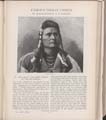
stnic.190806.001.001.jpg
Famous Indian Chiefs
[illustration - Chief Joseph.]XI. THE GREAT WAR-CHIEF JOSEPH OF THE NEZ PERCES*
FAR in the northwest of our country live the Chopunnish or Nez Perce Indians, a powerful tribe. Chopunnish is an Indian word, but "Nez Perce" is French and means "nose-pierced" or pierced nose. These Indians used to pierce their noses and wear rings in them.
The men of the tribe are large and tall and Strong, and they are very proud and warlike. Every year they went far away, even one thousand miles, to hunt buffalo, while the women planted little patches of Indian corn, and the boys rode ponies or fished for salmon in the rivers. Now and then the Nez Perces fought, as all Indians do, and their enemies were especially the Black-Feet and Snakes; but they had never killed a white man. Governor Stevens, one of the first white governors, gave these Indians a large tract of land bigger than New York State, where they lived and were very happy. After a while some missionaries came to live among them and started a big school where many Indian children studied and learned the white men's ways. Among these were the two sons of a powerful chief called Old Joseph. Young Joseph and Ollicut went to the school for a short time, but while they were still very small their father became angry with another chief and moved off to Wallowa, a place far away on the Nez Perce Reservation.
Then the white people began to see that this country was a good place to live in,
and most of the Indians agreed to sell part of their big reservation and live on
a part called the Lapwai lands, or reservation, but after this was arranged it
was found that several bands of Nez Perces lived outside of this smaller
reservation—the Pronounced, nay pairsay.
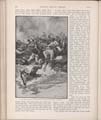
stnic.190806.001.002.jpg White Birds under their leader, White
Bird; other Indians under a chief called Looking-Glass; several other bands, and
some Indians led by [illustration - "For many months there were
battles—battles—battles!"] Young Joseph, who had become their chief after Old Joseph died. These
many bands of Nez Perces came together and made Young Joseph their chief. They
said that the other Nez Perces had no right to sell their land, and that they
did not wish to leave their homes.
In April, 1877, I took some soldiers and went to a fort near Walla Walla, Washington, many miles south of Fort Lapwai. Here I met Ollicut, who came to represent his brother, who was sick. At his request I agreed to meet Joseph and his friends or Tillicums in twelve days at Lapwai, Idaho, and we all hoped that the meeting would result in a good peace. When I arrived at Fort Lapwai twelve days later an immense tent was ready for the Council. Joseph, with about fifty Indians, had spent the night near-by in handsome Indian lodges. His many ponies, watched by Indian lads, were feeding on the banks of Lapwai Creek. All was excitement, as with some officers I waited for the Indians to come that sunny morning to the "big talk." At last they came, riding slowly up the grassy valley, a long rank of men, all on ponies, followed by the women and children. Joseph and Ollicut rode side by side. The faces of all the Indians were painted bright red, the paint covering the partings of the hair, the braids of the warriors' hair tied with strips of white and scarlet. No weapons were in sight except tomahawk-pipes and sheath knives in their belts. Everything was ornamented with beads. The women wore bright-colored shawls and skirts of cotton to the top of their moccasins.
They all came up and formed a line facing our square inclosure; then they began a song. The song was wild and shrill and fierce, yet so plaintive at times it was almost like weeping, and made us sorry for them, although we could not but be glad that there were not five hundred instead of fifty.
They turned off to the right and swept around
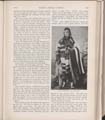
stnic.190806.001.003.jpg outside our fence, keeping up the strange song all the way around the fort,
where it broke up into irregular bubblings like mountain streams tumbling over
stones.
Then the women and children rode away at a gallop and the braves, leaving their ponies, came in all in a single file with Joseph ahead. They passed us, each one formally shaking hands, and then we sat down in the big tent, and the pow-wow began. I spoke to Joseph and told him that his brother Ollicut had said to me twelve days ago in Walla Walla that he wished to see me— now I was ready to listen to what he wished to say. Joseph then said that White Bird's Indians were coming; they were to be here soon and we must not be in a hurry, but wait for them. So we put off the "big talk" till the next day.
Again the Indians went through the same performance and again we were ready. White Bird had arrived and with a white eagle wing in his hand sat beside Joseph. Joseph introduced him to me, saying: "This is White Bird; it is the first time he has seen you." There was also an old chief, Too-hul-hul-sote, who hated white men. When they were seated again I told them that the President wanted them all to come up to a part of Lapwai, where nobody lived, and take up the vacant reservations, for the other lands had been given to the white men and other Indians.
Joseph said: "Too-hul-hul-sote will speak."
The old man was very angry and said: "What person pretends to divide the land and put me on it?" I answered: "I am the man." Then among the Indians all about me signs of anger began to appear. Looking-Glass dropped his gentle style and made rough answers; White Bird, hiding his face behind that eagle wing, said he had not been brought up to be governed by white men, and Joseph began to finger his tomahawk and his eyes flashed. Too-hul-hul-sote said fiercely: "The Indians may do as they like, I am not going on that land."
Then I spoke to them. I told them I was going to look at the vacant land and they should come with me. The old man, Too-hul-hul-sote, should stay at the fort with the colonel till we came back. He arose and cried: "Do you want to frighten me about my body?" but I said: "I will leave you with the colonel," and at a word a soldier led the brave old fellow out of the tent and gave him to a guard.
Then Joseph quieted the Indians and agreed to go with me. We did not hasten our ride, but started after a few days. We then rode over forty miles together. Once Joseph said to me: "If we come and live here what will you give us? —schools, teachers, houses, churches, and gardens?" I said, "Yes." "Well!" said Joseph, "those are just the things we do not want. The earth is our mother, and do you think we want to dig and break it? No, indeed! We want to hunt buffalo and fish for salmon, not plow and use the hoe."
Well! After riding all over the country the Indians said it was a good country, and they [illustration - Chief Joseph in Full Costume] agreed to come and live there. The land was staked out, and Too-hul-hul-sote set free, and it was arranged that in thirty days all the outside Indians should be on the reservation, and we parted the best of friends.
Now, about this time Joseph's wife was taken sick, so he left his band and
stayed away some distance with her in his lodge. While he was away some of the
young warriors came to a farm-house and began to talk with two white men. For
some reason they did not agree, and a
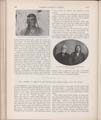
stnic.190806.001.004.jpg
[illustration - A portrait of Chief Joseph on birch bark.] young Indian tried to take a gun out of the farmers hand. At once the
farmer was frightened and called to the other white man for help. That white man
ran up and began to shoot, killing the Indian. Now began all sorts of trouble.
The Indians stole horses, burned houses, robbed travelers, and the whole country
was wild with terror.
Joseph at first did not know what to do, but at last he broke his agreement with me and all the outside Indians went on the war-path. For many months there were battles—battles—battles! Joseph was a splendid warrior, and with many of Uncle Sam's good soldiers he fought. I followed him for over fourteen hundred miles, over mountains and valleys, always trying to make him give up. At the last I sent two Nez Perce friends, "Captain John" and "Indian George," to Chief Joseph's stronghold in the little Rockies with a white flag to ask him to come in and surrender.
Joseph sent back word: "I have done all I can; I now trust my people and myself to your mercy."
So the surrender was arranged, and just before night on October 5, 1877, Joseph, followed by his people, many of whom were lame and wounded, came up to me and offered his rifle.
Beside me stood General Nelson A. Miles, who had helped me and who had fought the last battle, and so I told Joseph that he, General Miles, would take the rifle for me.
Thus ended the great Nez Perce War, and Joseph went after a time to live with Moses, another chief of whom I am about to tell you.
Twenty-seven years later I met Chief Joseph, the greatest Indian warrior I ever fought with, at the Carlisle Indian School, and there he made a [illustration - General Howard and his "good friend" Chief Joseph.] speech: "For a long time," he said, "I did want to kill General Howard, but now I am glad to meet him and we are good friends!"
XII. Moses, a Great War-Chief Who Knew When Notto Fight
IN the northwest of our great country there are so many different tribes of Indians that I cannot begin to tell you their names, but they were often divided in this way. Those who lived on reservations were called "Reservation Indians" and those who did not "Outside Indians." Now, Moses was chief of a great many tribes of Outside Indians and he was a very great chief. Of course, Moses was not his Indian name, but Governor Stevens gave it to him long ago and every one called him so, indeed, he seemed to have forgotten his Indian name and called himself Moses. He was a very handsome man, tall and straight, and always well dressed. He usually wore a buckskin coat and trousers, and handsome beaded moccasins, and a broad, light felt hat with a thin veil encircling it. He always had a leather belt around his waist, in which he carried a long knife and pistol holster, the ivory pistol knob in plain sight.
Now, Moses had led his Indians in many battles, both against Indians and white
men, and everybody knew that he was a brave warrior and could fight. Indeed, in
1858 one of the very fiercest battles we ever had with the Indians took place
when Moses was the Indian war-chief and General George Wright commanded the
United States soldiers at the "Battle of Yakima River." But after Mr. Wilbur
became the Indian agent tilings changed, for the Indians loved him and
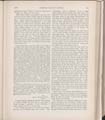
stnic.190806.001.005.jpg called him Father Wilbur, and Moses
decided not to fight the white men any more.
Many times Moses was asked to go on a reservation, but he always replied that he would live on a reservation, but not with Indians he did not know. Many tribes had asked him to be their chief, and he wanted "Washington" to give him the land in a bend of the Columbia River for a reservation. It was waste land, he said, where no white people wanted to live, but the Indians would be happy there, he knew. When Chief Joseph led the Nez Perces against us in the many battles I have told you about, he sent often to Moses to ask him to come and fight too, but Moses always said "No." Still this chief did not have an easy time, for many people said he was a bad Indian, and at last he wrote me a letter which I have kept many years and which I am sure you would like to see.
I Moses Chief want you to know what my Tum-tum is in regard to my tribes and the white people. Almost every day there come to me reports that the soldiers from Walla Walla are coming to take me away from this part of the country. My people are constantly excited and I want to know from you the truth so I can tell my people and have everything quiet once more among us. Since the last war, we have had reports up here that I Moses am going to fight if the soldiers come; this makes my heart sick. I have said I will not fight and I say to you again I will not fight and when you hear the whites say Moses will fight, you tell them no. I have always lived here upon the Columbia River. I am getting old and I do not want to see my blood shed on any part of the country. Chief Joseph wanted me and my people to help him. Id's offers were numerous. I told him no—never. I watched my people faithfully during his war and kept them at home. I told them all when the war broke out that they should not steal; if any of them did I would report them to Father Wilbur. During all the past year I have not allowed any stranger Indians to come here fearing they would raise all excitement with my Indians. I am not a squaw— I know how to fight, but I tell you the truth. I do not want to fight and have always told my people so. It is about time to begin our spring work as we all raise lots of vegetables and wheat and corn and trade with Chinamen and get money.
I wish you would write me and tell me the truth so I can tell my people so they will be contented once more and go to work in their gardens. I do not want to go on the Yakima Reservation as I told Colonel Watkins last summer. I wish to stay where I have always lived and where my parents died. I wish you would write to me and send by the bearer of this letter. And be sure I am a friend and tell you the truth.
His
Signed : MOSES X Chief.
MARK
I replied that the Bannock Indians were giving me much trouble, but that when I got back I would arrange a meeting. In the meantime I would depend on him to keep peace.
Now, during this time it was hard for Moses, for two sets of Indians gave him trouble. The "Dreamers," led by Smoholly, tried to make Moses think that he should join many tribes and fight the white men, for, said they, all the Indians who have gone to the happy hunting-lands will rise from the dead before long and join us, so you must join, too. But Moses would not fight. Then some of those Indians who were fighting crossed over the Columbia River and, finding a family by the name of Perkins living far from any settlement, killed every member of the family and burned their house and barn.
Some Indians told the white men that Moses was a friend of these dreadful warriors and was protecting them. The white people of Yakima City believed these idle tales and even accused Moses to me, but when I met him and we talked it over, he said that he would prove that what he said was true, for he would help find the three Cayuse Indians who had done this wrong and give them up to the Yakima courts.
Always true to his word, he took with him thirty-five Indians and began to hunt. One evening Moses and his band camped for the night, and fearing no harm, were fast asleep, when a large body of white men surrounded them. These men seized Moses and bound him with cords, putting irons on his wrists. but still he would not fight and told all his Indians to point their rifles to the ground and offer no resistance. He said afterward that he gave up his pistol, knife, and gun and prepared to die, but instead he was taken to Yakima City and put in the jail or "Skookum House," as the Indians call it. Here Mr. Wilbur promised enough money to make them take off the irons, but still Moses was a prisoner. Then he said: "Let the one-armed soldier-chief, General Howard, know I am a prisoner. He is my friend and as soon as he knows it he will set me free." And this he constantly repeated. I was far away when the news reached me, but I came immediately and ordered that Moses be at once set at liberty, and I have never been sorry that I did so, for he was a true friend to the good white people, and by his simple word kept many hundred Indians at peace.
When he was free Moses asked again for a reservation, and at last it was given to him and to his people. There on the banks of the Columbia River he kept his people at peace and had them work farms and gardens.
The last time I saw him he visited me at Vancouver Barracks near Portland, Oregon, when, with many chiefs, he was on his way to Washington to visit the President of the United States. He was a brave war-chief and not afraid to fight, though he had learned to know that peace is best.